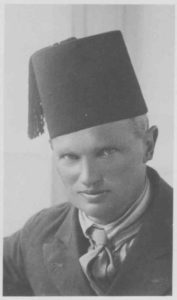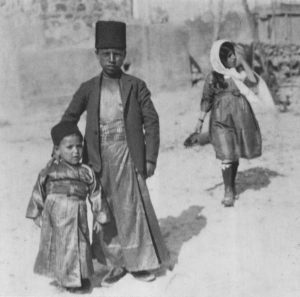
Portrait of Frank Scholten from his obituary card
Op maandag 10 december vindt de najaarsledendag 2018 van het Nederlands Fotogenootschap plaats in Universiteitsbibliotheek Leiden. Deze bijeenkomst heeft de vorm van een symposium, waarin de bijzondere fotocollectie van Frank Scholten (1881-1942) centraal staat. Een collectie over Palestina in de jaren 1921-23, in de tijd dat het land overging van de langdurige Ottomaanse overheersing naar de moderniteit, die werd ingeluid door het in werking tredende Britse mandaat met een geheel andere cultuur en bestuursstructuur. Hoewel Palestina in die tijd meer werd gefotografeerd, is deze Nederlandse fotocollectie in meerdere opzichten uniek te noemen. Welke redenen dat zijn, kunt u vernemen in het symposium op 10 december dat geheel in het Engels zal plaatsvinden.
Aanmelden via aanmelding@library.leidenuniv.nl (onder vermelding van “Frank Scholten”) of telefonisch via het secretariaat van de UB Leiden: 071-527 28 32.
The ‘Holy Land’ and Modernity: the Frank Scholten Collection in Context
symposium and hands-on viewing of Frank Scholten photographs and albums
in collaboration with the Nederlands Fotogenootschap
and the NINO (Nederlands Instituut voor het Nabije Oosten)
10 december 2018; Hensius and Vossius rooms, Leiden University Library

Photo Frank Scholten, Photo 227 from his book La Palestine illustrée, vol. 1: “His fairest festal garments.”
Frank Scholten and His Legacy
Frank Scholten travelled to the Middle East in the early 1920s, photographing contemporary life in British Mandate Palestine as well as documenting archaeological and historical sites throughout the region. Teresa Lidia Kwiecién’s paper compiles a valuable biography detailing his life and movements.
Scholten’s methodology was atypical juxtaposing religious Christian, Muslim and Jewish scriptures to images of daily life. Although it is tempting to compare his prolific work to more common French and British collections, often explicitly biblified, Scholten adopted a more liberal, multi-confessional approach to imaging. His work gives us an invaluable historical account of pluralism in the ‘Holy Land’, which eschews the typical European tendency to efface the modern in favour of the ancient.
Modernity and the ‘Holy Land’
This period of great flux, after the collapse of the Ottoman Empire, saw the establishment of the incoming British Administration and the Third Aliyah (Jewish immigration), creating new layers in the already complex social fabric of the region.
Scholten is particularly interesting, if not unique among European photographers, in that he was also concerned with imaging modernity in the ‘Holy Land’. He actively reconciled modernity with Christian, Muslim and Jewish religious text. Activities of the Yishuv, Jewish settlement, the proliferation of Arab industry and newspapers sit alongside detailed ethnographic studies and images of archaeological and historical sites, all framed with a sense of the social importance of religion.
Collections
His two volume books, published first in French, then German, English and finally a singular volume in his native Dutch. Each edition has the same set of images and a relatively stable set of religious quotations, but within them are slight variants. This shows a keen awareness and sensitivity to the relationship between Europeans and their various affiliations to local populations.
His one and only exhibition was at the Brook Street Gallery in London in 1924. Though no catalogue appears to have produced for this exhibition which lasted only five days, it is estimated that approximately 2,000 photographs were shown from his body of 27,000. His books, likewise, only show a few hundred of his images, meaning that the vast bulk of his work has never been seen publicly.
NINO holds the legacy of Frank Scholten; see also http://www.nino-leiden.nl/collections/frank-scholten-legacy. Leiden University Library has been storing the fragile materials in the Scholten Collection in climatised conditions in their special collections since 2007. A new cooperation between NINO, Leiden University Libraries and the NWO-funded project CrossRoads has recently started.
Nederlands Fotogenootschap
Speakers:
- dr Maartje van Heuvel: Introduction
- Carolien van Zoest: NINO and the Frank Scholten Legacy
- dr Karène Sanchez: Photography, Modernity and the CrossRoad Project
- dr Sary Zananiri: Frank Scholten: An Invaluable Dutch Vision of the ‘Holy Land’?
13.30u: doors open and coffee
14.00u: Dr. Maartje van Heuvel (Leiden University Library): Introduction
14.10u: Drs. Carolien van Zoest: NINO and the Frank Scholten Legacy
14.30u: break and possibility to view photographs
15.00u: Dr. Karène Sanchez: Photography, Modernity and the CrossRoads Project
15.30u: Dr. Sary Zananiri: Frank Scholten: An Invaluable Dutch Vision of the ‘Holy Land’?
16.00u: possibility to view and discuss photographs, questions
16.30u: drinks
17.00u: end of program
Plaats: UB Leiden, Witte Singel 27, 2311 BG Leiden.
Meer informatie: m.e.n.van.den.heuvel@library.leidenuniv.nl